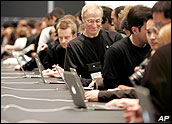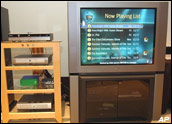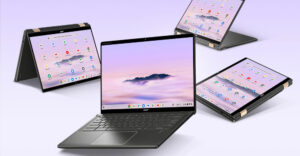
Dell is going after emerging markets with a new line of low-cost computers. The Vostro notebooks and desktops are the company’s first models targeted specifically at China, India and a handful of other Asian, African and Latin American nations. The systems will sell for about the equivalent of US$440 to $475.
The move marks a distinct shift in strategy for Dell, which has previously focused on building standard products that stay constant from country to country. The change follows similar steps by competitors such as HP and IBM, which are pushing low-cost models of their own in the same geographical regions.
Simpler Systems
The smallest of Dell’s new systems is the Vostro A840 laptop, offering a 14.1 inch screen — compared to its bigger brother, the A860, which boasts a 15.6 inch display. Both computers come with full networking capabilities powered by either Intel Celeron or Pentium Core 2 Duo chips and 1 GB of memory. Unlike the counterparts seen in countries such as the U.S., however, these systems come with pre-set configurations and don’t offer many customizable features.
“Really the only thing you can choose here is the operating software, so you can have a Linux-based product or Windows-based,” Dell spokesperson Gretel Perera told TechNewsWorld. “That’s pretty much the only configuration you can choose — as opposed to the U.S., where you can configure everything you want,” she said.
The inclusion of Linux, in the form of the Ubuntu operating system, was a deliberate decision based on Dell’s research.
“Linux is highly used in emerging markets and widely accepted,” Perera pointed out. “It allows us to offer a more basic computing and affordable computing [platform].”
Moving up a step, the Vostro A180 and A100 offer similar specs in a desktop form, with the addition of expandable graphics options and a full open source office software suite. Still, you won’t find any extra frills on these computers — and that’s just how Dell wants it.
“They really were made with the emerging markets in mind and the needs of these small businesses,” Perera explained. “The products revolve around those needs — affordability, access to technology, only the software they want — basic computing needs,” she said.
Business Thinking
The thinking behind Dell’s decision is easy to understand: Its sales skyrocketed in places such as China, India, Brazil and Russia during the first quarter, jumping up more than 50 percent from their previous rates. That’s 10 times the growth rate seen in America, Dell executives say, and they’re expecting to see even more expansion there in the future.
“There’s no question that some of our largest tech companies, who have been so successful as global competitors, are finding that there are new competitors from emerging markets and from even more advanced economies,” C. Richard Torrisi, associate professor of international business at Suffolk University, told TechNewsWorld. “The way for them to remain competitive and to keep growing is through designing products that reach out to consumers in emerging markets who have the purchasing power — and now, the desire — to connect to the global economy through the Internet and through technology,” he said.
The tactic shared by Dell and its competitors reflects that notion as well as the need for affordability — something else Torrisi sees as paramount to success.
“The key, I think, is designing products with the proper price points for consumers in emerging markets. So it’s not a question only of innovation, but a question of design and efficiency to reach those hundreds of millions of potential consumers,” he noted.
Ultimately, Torrisi said, the companies have to see these emerging markets as independent entities that don’t have the same needs as the U.S. That means forging alliances with local distributors and firms to conduct separate research and development missions — because the findings in America simply won’t match the requirements of those customers. Dell echoes that sentiment.
“We’ve really developed an entire strategy … to meet the needs of these emerging countries,” Dell’s Perera said. “We have an entire design and development team just for [that].”




















































